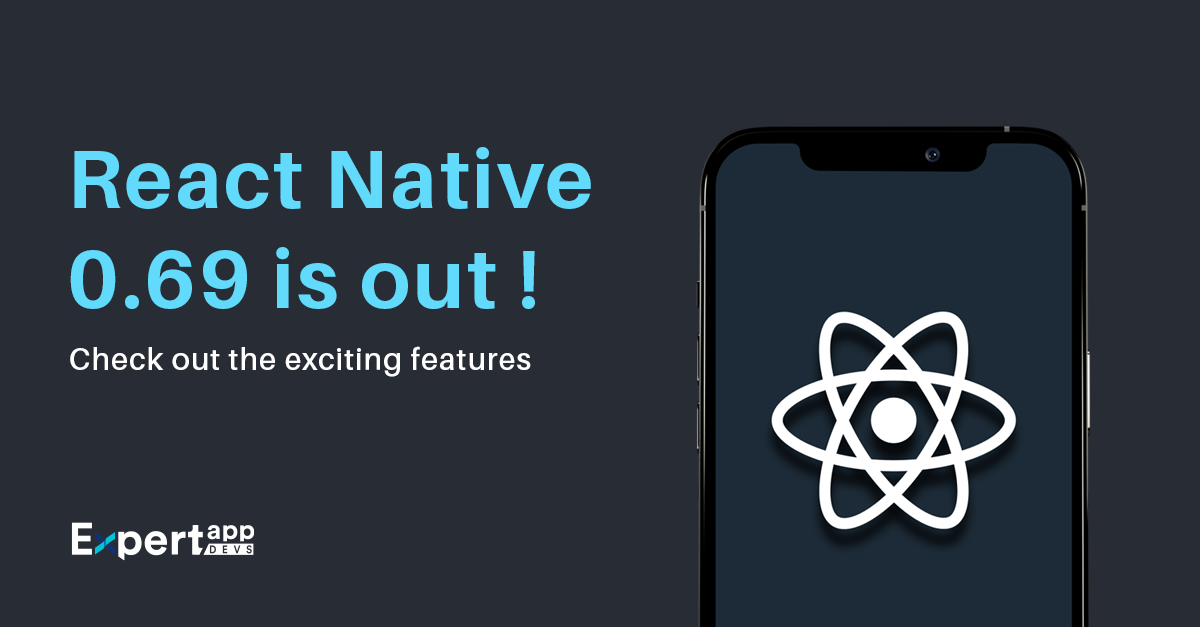The Big Changes Coming to Your Development with React Native V 0.69.0
Just two days back, React Native announced the release of its latest version, 0.69.0. The whole community has been speculating on what to expect with this release. We have been excited since the release, and our team has spent a lot of time dissecting the upgrades and how they can help the developers.
In this blog, we will take you through everything new and incredible about the latest version. Let’s get started.
The Big News
This is the first-ever version to support React 18, and that is the biggest news.
- With React 18, the makers enhanced the framework, added new tools, and introduced hooks like useID.
- The new React version also introduced full suspense support and concurrency features. Developers can use these features for mobile apps with the new RN version.
- Once you implement the new architecture, this means you can use the concurrent rendering and other related features.
For developers, you can reduce the time spent debouncing and throttling the user interface. Eventually, it improves the app performance keeping the browser responsive.
Check out how React 18 in RN version 0.69.0 can improve mobile app development.
Hermes on React Native
Hermes is the open-source JavaScript engine used to optimize RN apps for Android. Earlier, the version releases for Hermes and React Native occurred separately. The developers could not identify which version of Hermes could be used to optimize the React Native app.
React Native has ensured that both version releases will happen simultaneously to ease this and make the compatibility easy for both platforms. A compatible version will be released for both frameworks together, thus reducing the confusion.
Migrating to Hermes will give developers the best experience and help improve productivity.
Here’s your complete documentation on how to use React Native-Hermes bundle.
Feature Upgrades/Updates
- With this new version, developers can build apps for iOS/tvOS. It supports the SDK11.0.
- It offers better support to M1 users in Android app development.
- With the new version, you get .xcode.env for node executions.
- To debug the iOS app, the hotkeysenabled has been added to the menu.
- A new CLI version 8.0 has been released with the RN 0.69.0
- Autolinking has been initiated.
- Commands that have been removed include
- initCompat
- run-android
- install/uninstall
- podspecPath
- –project-path
- The new version has removed its supporttowards console.disableYellowBox
- If any developer has been using Segmented ComponentIOS for their Apple apps, they need to use a third-party library.
The upgrades released with this version include:
The new version has upgraded a few dependencies, including:
- The Bump of AGP has been upgraded to 7.1.1
- Boost in Android has been updated to 1.76
- Ruby for the version is now at version 2.7.5
There have been some architectural changes as well. Some new tools and resources have been added to improve the effectiveness of the application. Check out the documentation to fully understand the new React Native version.
React 18 for RN 0.69.0: What Does it Mean for Developers?
We discussed in the big news how React Native's new version is compatible with React 18. So, how does combining React with React Native help app developers?
- React was developed as a frontend JavaScript library to enable application interface development. On the other hand, React Native is a framework designed to offer tools and resources specifically for cross-platform development.
- The React code you write in React Native will bridge the gap between JavaScript and mobile devices' native properties. You can achieve applications that render on both iOS and Android.
React is automatically added to your React Native projects with the new version. This would reduce developers' time migrating a React Native project from React. You will be able to use the new features introduced with React automatically in your RN mobile app projects.
You will have to migrate your projects to the new architecture to start using React's out-of-the-box features.
React versus React Native
Some differences include the user interface presentation and user experience flow, which can cause compatibility issues when trying to convert a project from React to React Native and vice versa.
Before we show how you can overcome this challenge, here are a few differences between the two frameworks.
- The Technology Used: The code rendering is different for both.
- React uses Virtual DOM to render
- React Native is more like a bridge between native components and React JS library, which compiles using native APIs
- Routing and Navigation: For this purpose, React uses external libraries to make way for smooth transitions.
- However, React Native comes with a navigator component.
- In the case of a simple or medium-to-complex app, you won't need external libraries with React Native.
- Platform-specific Code: For React Native, you must develop projects using platform-specific code. You need to follow the UI/UX guidelines for the particular platform.
You can share codes between the two platforms despite the varying codes and navigation abilities. You will need to use Render Props to achieve the same.
For example, Netflix uses Gibbon as the rendering layer to achieve the application on both React and React Native.
How React Native Improves Developer Productivity?
1. The framework has been devised using the right tools and resources that can help speed up development. You can choose from the code editors available on this platform. You can also select the development environment you feel most comfortable with it.
2. Code sharing is one aspect that enhances React Native app developers’ productivity. Creating a single code and sharing it among operating systems allows you to develop apps for multiple platforms without delay.
3. The hot reloading feature allows developers to make changes in the live environment. As a result, your changes are quickly updated and don’t hamper the ongoing app experience.
Hiring the React Native App Developer India
Developing an app using React Native allows you to deliver native-like mobile app solutions for iOS and Android. It is essential to be visible on both platforms to enhance business visibility.
To ensure you can develop a suitable solution and accelerate the time-to-market, you should outsource app development. An expert React Native team can help align your app to business goals and match up to your expectations.
Expert App Devs are proficient with React Native framework and have delivered successful app solutions with this platform. With our expertise and experience, you can deploy capable apps within the defined timeline.
Consult our experts and realize your apps today.
 Jignen Pandya
Jignen Pandya




